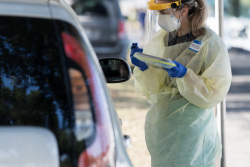A vigorous COVID-19 testing effort at The Villages® by University of Florida Health researchers and their collaborators shows that social distancing appears to be having a positive effective in this community of older adults.
UF Health, working with The Villages Health and state health and emergency management officials, completed 3,680 tests at The Villages® through last week in what is considered one of the largest testing efforts of its kind in the nation. Overall, just 1% of those people tested, or 45 cases, were positive for the coronavirus.
The novel coronavirus testing effort met the original goal of 2,000 tests early on and has now nearly doubled that number, even as many communities around the nation have struggled to gain access to test kits. Results so far offer reason for guarded optimism, UF Health officials say, warning continued viligence is critical to continuing to stem the growth in the number of cases.
“UF Health’s commitment to The Villages® and all the communities we serve made it a priority to better understand how the coronavirus spreads through a vulnerable community of older adults,” said David Nelson, M.D., senior vice president for health affairs at UF and president of UF Health. “This testing helps us do that, ensuring our health care system is better armed with data to determine how best to deal with not just this outbreak, but future epidemics as well.”
Elliot Sussman, M.D., chairman of the board of The Villages Health, and former board chairman of the Association of American Medical Colleges, said the testing offered a better snapshot of COVID-19’s movement through a community than found almost anywhere in the United States.
“Few communities have undergone the kind of rigorous testing UF Health and its collaborators have brought to bear at The Villages®,” Sussman said. “It’s essential, important work. We can’t fight the coronavirus until we understand it. And this testing effort will provide us some pieces of a very large puzzle. This is not done for the sake of science alone. It’s done to protect our communities and the lives of our neighbors.”
A breakdown of results shows 42 positive cases out of 1,580 people tested who were exhibiting symptoms of COVID-19, the disease caused by the coronavirus, such as coughing and fever. That is just 2.7% of clinical tests.
Additionally, just three out of 2,100 asymptomatic people in a voluntary research study tested positive. This research used a testing assay that is not yet approved by the U.S. Food and Drug Administration, said Michael Lauzardo, M.D., an infectious disease specialist at UF Health, adding that the research study is a valuable public health activity to identify people with early disease — those who have the virus but are not exhibiting symptoms but potentially could be spreading it.
“The big takeaway is that social distancing and isolation has been working at The Villages®,” said Lauzardo, deputy director of the UF Emerging Pathogens Institute and and an expert in infectious diseases and global health. “It’s really encouraging that the curve has been flattened. We are where we need to be. We’re protecting the community through policies that have been implemented across the state and region.”
Lauzardo added, “The next step is determining how we reopen while still keeping people safe.”
Clinical testing will continue at the Villages today and Thursday, with a total of 300 tests each day. UF Health will conduct follow-up research testing at The Villages® at a later date.
“Focusing on additional higher-risk patients elsewhere, including those living at nursing homes, makes sense given the low numbers we’ve seen in the research study at The Villages®,” Lauzardo said. “There are tight resources everywhere. This is a rapidly evolving situation.”
During testing at The Villages®, volunteer UF Health medical professionals together with personnel from The Villages Health primary care network evaluated people who had preregistered for an appointment. Testing was done for people with symptoms associated with COVID-19 and for those without symptoms. Participants were assessed for symptoms, travel and exposure history and tested if they met clinical criteria. Depending on the severity of their illness, they were further evaluated on-site or at a UF Health facility or sent home to self-quarantine while awaiting test results.
If someone was concerned yet did not have symptoms nor meet standard clinical testing criteria, they had the opportunity to sign up for the UF Health research study, which enabled them to receive a test as part of an epidemiological protocol known as community surveillance.
While the numbers are encouraging, Lauzardo said, it is important to continue to monitor the outbreak.
“We will go back and do more research testing later after the epidemic has had time to evolve and change,” Lauzardo said.
Testing was open to those living in The Villages® and nearby communities. But the majority of those who registered to be tested — 83% — lived in the The Villages®. Their median age was 70.
This story was originally posted on UF Health.

